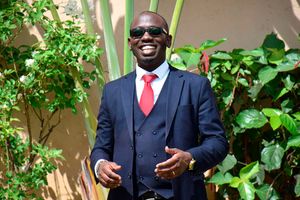Premium
Age 30: The time to accept that you may never make it

What you need to know:
- This is the age, I think, that becomes a place of failed dreams because it could never overcome its initial promise.
- Those older than us will tell us, Young man! Run your own race; but they fail to mention that the starting point is similar, and it is hard not to look up and see the others sprinting ahead of you.
- The 30s, really, are a graveyard for fantasies.
We are sat at a table overlooking Lake Victoria, or if you want to be pseudo-Pan African about it, Nam Lolwe. The sun has cast a golden shadow on the waters so that it looks as if the lake has a gilt-edged coating feel to it. It is beautiful, I think. I can't (won't?) swim, whether intentionally or otherwise, so I fixate my bum on the cheap plastic chairs, the default aesthetic of Kenyan local restaurants. The waiter, Adhiambo, asks us if we are okay every five minutes, “Mnajua nyinyi vijanawa siku hizi na maandamano haha!” The whole thing has a frantically performative vibe that borders on the evangelical—with Adhiambo in the role of the youth pastor palpably desperate to keep you going to church, but we are already converted.
We are here because our friend, Ken, is turning 30, that's partly why we are here, and partly why we keep the conversations, like our beers, “lite”. Age is an interesting thing, the difference between 29 and 30 is a mzinga and a ka-quarter. Brian is having Tusker Lite because he can, I am having Tusker Cider, warm, because I can, Ndungu and the birthday boy are having tea, but really it is chai mrefu, water with a rumour of milk, an apt microcosm of life in Kenya. When I think about it, we have about five years left to be UN-classified youth in Kenya, and we are still grappling with issues of adulthood – are we mature enough? We are getting older on paper, yes, but that's about it.
Where did the years go?
Ken seems deep in thought, the gong of the 30s hitting like an impeachment letter, like a negative DNA result, like eating misheveve when all you want is sarat. Unfortunately, you’ll have to take my word for this: Life in the 30s is like that horror film, The Wrong Turn. I don’t think we need an explanation for this. No, I don’t hate growing old. I am making peace with the gods, that nothing turns out exactly as intended. It’s why most men prefer to simply acknowledge their birthdays and move on, reflecting on the regrets and could-have-beens. Biko’s girlfriend told me that the 30s go by in a flash. You are 30 today, tomorrow 32, and before you can say, “Anguka nayo” you are 45 flirting nonchalantly with retirement. A cruel sarcasm rules over our lives. Sometimes freedom’s opportunity is a wide waistline. We must all make do with the rags of life we find flapping on the scarecrow of time. Grey hair, did our elders not tell us, even the pagans respect it?
We don’t talk much nowadays with these boys. We understand each other instinctively. We know each other in a way our girlfriends should never know us. As we sat there, Ken got a call that his father had been diagnosed with diabetes. Later, he was involved in a minor accident. He is effectively the leader of the home now. With time, life, the Möbius strip of illusions, does a job on all of us. The parent becomes the child, the child becomes the caregiver. I was reading this book recently where Carl Jung, that often quoted psychotherapist, wrote that “the greatest burden a child must bear is the unlived life of the parents,” by which he meant that where and how our caretakers were stuck in their development becomes an internal paradigm for us also to be stuck. Without wishing to be too maudlin, one day you are cock of the walk, the next a feather duster.
There is a clear-sightedness that comes with aging. It is a new clarity—the kind of madness that overcomes Pauline travellers on the road to Damascus. You meet yourself. You know your potential. You know exactly the limits of your wingspan, and you stop lying to yourself.
We are none the wiser now so we regurgitate advice passed to us from our parents. Ndungu says you do you. Brian says, kijana, you got this. Me? Me I pass wisdom accrued from the backs of lorries I see in traffic: “Mimba na kitambi, yote ni bidii ya mwananume.” I think the wahenga would be proud of me.
We settle into a lull and not the first time we beat stories of the boys we grew up with in the village and the hand that life dealt each of us. If we were in the village, we would all have our own thingiras, our snooty little children with protruding stomachs running around our well-kept grass compound. In the evening, we would retire to the small social hall hapo centre, to watch Manchester United get beaten by a kasmall kateam like Chelsea, as our wives fulfilled their traditional African motherhood and prepared misheveve for dinner and waited for us to come and shake the bed at night. We would repeat this until we died, or until Manchester United beat a kasmall kateam like Chelsea—pardon the tautology. But our lucky draw was the city, and here we are, cursed to the treadmill as the hands of time peel off our skins, this city where wealth is a religion and money is Jesus.
If in the 20s life is blind, then in the 30s it is an eye-opener—we were blind but now we see—that perhaps we may never even make it to the Kenyan middle class. We don’t say it among ourselves but it is there with us, that gnarling feeling, an existential snarl that the runway is getting shorter, that the clock is ticking faster with the precision of knives in a circus act outlining the victim, the lump in our throat manifesting as a fear of failure, a fear of not being something, of not being someone.
This is the age, I think, that becomes a place of failed dreams because it could never overcome its initial promise. Those older than us will tell us, Young man! Run your own race; but they fail to mention that the starting point is similar, and it is hard not to look up and see the others sprinting ahead of you. The 30s, really, are a graveyard for fantasies. Is it not written in the Desiderata, “Take kindly the counsel of the years, gracefully surrendering the things of youth.” This is the crux of human experience: To want and to not get.
I ask Ken, what do the 30s feel like?
“It’s like standing in the mirror naked,” he says.
“Naked?” I say. “Ken, my mother is reading this! And Grace wa PCEA Women’s Guild too.”
“Okay. Not naked, naked, maybe with the Kenyan bracelet on.”
“Thanks. That’s much better.”
“But seriously, the 30s are a circus performance where I am juggling balls. My family, my girlfriend, my social life, my finances, my career…I am on the edge. If I snooze, one of the balls will hit my big toe. I am standing on a cliff, about to jump. I could fly or fall, but I have to jump.”
I resist the urge to ask him whether he will have the Kenyan bracelet on. In the horizon, Nam Lolwe whistles as the sun sets, not just on the lake, but on our 20s. Happy Birthday, Ken.





